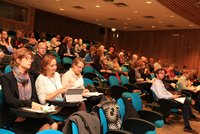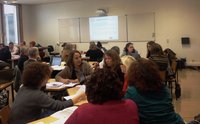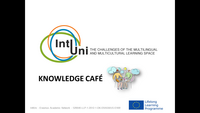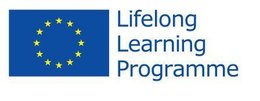Current status of IntlUni: Workshop and All-Partner Meeting in Braga, November 4-7th 2014
As with our previous All-Partner Meetings, IntlUni’s 5th proved to be an important milestone, as we move from identifying internationalisation challenges and good practice in the 38 participating HEIs towards finalising our recommendations for quality teaching and learning in the multilingual and multicultural leaning space. Two years into the project, what made this meeting special however was that it involved a host of superlatives and firsts.
2014.12.08 |


The panel of experts at the IntlUni workshop 5 November 2014.

Minho’s Vice-Rector for Internationalization Carla Martins welcomes everyone

Musical interlude

IntlUni workshop participants

Jos Beelen

Work package leaders Kevin Haines and Stacey Cozart presenting IntlUni principles

Partner representatives discussing inputs from the workshop

Group work session

The University of Minho in Braga, Portugal was our most westerly destination so far and our first conference venue in southern Europe, thereby enabling many of us to experience at first hand the oft-purported north/south divide regarding internationalisation in the European Higher Education Area (EHEA). The Braga meeting was also our largest and longest up to now, extending over four days and involving not just the partner representatives but also external experts in the field and key decision makers from our respective institutions. Marking the transition into the final year of the project and with the focus now very much on dissemination, developing the final recommendation, impact and exploitation, it thus represents a new departure in terms of reaching out to a wider audience.
Braga proceedings
Preceded on Tuesday by a meeting of the Management Committee and Work Package Leaders as well as an informal reception and dinner for all the participants, Wednesday was set aside for the workshop and began with the official opening that included a welcoming speech from Minho’s Vice-Rector for Internationalization Carla Martins, and a musical interlude. Next up was Project Coordinator Karen M. Lauridsen’s keynote speech, which set out the context, achievements and aims of the IntlUni project. As Karen noted, initial findings based on survey input from the 38 partner institutions across Europe (WP2-WP3) had confirmed an increasingly dynamic and diverse international teaching/research environment, with manifold implications for the quality of European higher education in terms of learning outcomes, added value and even graduate profiles. Subsequent analysis (WP4) of the rich data set had identified examples of successful practice, quality criteria and reference points. A key aspect to consider, alongside the linguistic, cultural and didactic issues, was that the impact of internationalization on the curriculum had far-reaching implications not just for the mobile, international students but also those remaining at home. Looking forward, the goal in the final phase of the project (WP5) would now be to develop a set of recommendations regarding their implementation at institutional, national and European levels. The workshop in Braga was thus an important stage, aimed at receiving pertinent input from external experts from cognate projects, as well as reaching out to stakeholders, including those decision makers present in the audience.
Workshop presentations by External Experts
Karen’s overview was then followed by presentations from the four invited external experts working on major European projects in the same field: Bernd Wächter, director of the Academic Cooperation Association (ACA); Jos Beelen, researcher and consultant from the European Association of International Education (EAIE) and Amsterdam University of Applied Sciences; Nick Byrne from the FIESOLE Project and director of the Language Centre at the London School of Economics and Political Science; and Axel Aerden from the Accreditation Organisation of The Netherlands and Flanders (NVAO) and the European Consortium for Accreditation (ECA), where he currently co-ordinates the Certificate for Quality in Internationalisation (CeQuInt) project.
New ACA study - the European map of English-taught programmes in 2014
Bernd Wächter opened the round of presentations by the external experts with a fascinating overview of the current state of (non-UK/Eire) English-taught programmes (ETPs) in the EHEA. ACA has been tracking the growth of ETPs across Europe since 2002 and the insights gleaned from the 2014 survey suggested that though exponential growth in ETPs, especially at Masters level, had slowed slightly since its peak in 2009/10, with one or two provisos, the Dutch, Scandinavian and Baltic “ETP power houses” confirmed an ongoing north-south divide. Further, we learned that ETPs were not solely concerned with attracting international students, since there was 44% domestic enrolment.
Internationalisation of the Curriculum
Linking to some of the insights in Karen’s overview of the IntlUni project and Bernd’s survey of ETPs, Jos Beelen then addressed the issues of terminology, trends and challenges in his presentation on ‘Internationalisation of the Curriculum’. With reference to the International Association of Universities 3rd Global Survey Report (2010) and the Erasmus Impact Study (2014), the interrelationship between internationalization of the curriculum (IoC) and at home (IaH) was discussed with a view to achieving comprehensive internationalization in the European context. In the EHEA, the phenomenon of IaH was not as dependent on incoming student mobility and does not presuppose outward mobility. While both the obstacles to and rationales for internationalization might still have a global dimension, the catalyst for strengthening IaH was the Erasmus staff exchange programme. With the focus on the professional development of academic staff and the revision of (in-)formal/hidden curricula, including disciplinary and institutional learning outcomes, Jos Beelen put forward a re-definition of IaH as “the purposeful incorporation of international and intercultural dimensions into the curriculum and wider student experience in domestic settings”.
Improve teacher training
We were then given the opportunity of seeing how such a purposeful approach has been put into practice, albeit at the post-doc level, with Nick Byrne’s presentation on the FIESOLE project. Founded in 2006 and involving several top European research universities and institutes, the aim of the network project was to improve teacher training for top-flight academics participating in the Max Weber Programme for social scientists. With a special focus on communication skills linked to the mobility and employability of future academics, the FIESOLE Group identified three themes around which the training activities were to be organised: publishing and writing; the job market and presentations; teaching and assessment. By integrating dedicated Teaching Practice Weeks into the programme, the participants were given the opportunity to participate in an international setting in a series of workshops, tutorials and lecture observations that included course design, teaching in culturally and linguistically diverse classrooms as well as classroom management techniques. Even within such an already high-powered European research network, as Nick Byrne emphasized, by means of a reflective, mutually supportive learning approach, effective teaching skills add significantly to the international employability and mobility of up-and-coming academics.
Assessing the quality of internationalisation
Next up was Axel Aerden with his presentation on assessing the quality of internationalisation in higher education. The aim of the CeQuint project was to provide a methodology for assessing, enhancing and rewarding programs and institutions for the quality of their internationalization. A pan-European range of national and international stakeholder agencies and HEIs were involved in piloting the project and had produced a set of framework and guideline documents for assessing internationalisation at programme and institutional level. The onus here, according to Axel Aerden, was on addressing the challenges linked to intended internationalisation, i.e. it is up to stakeholders in the individual institutions and programmes being assessed to determine the type of internationalisation that best suits their needs with regard to their own specific context. In that sense, quality assessment should be descriptive and low on impact, enabling the programme or institution to formulate, document and monitor verifiable objectives with regard to its internationalisation objectives. As a next step for example, one of the perceived challenges would then be to ascertain whether the defined international and intercultural learning outcomes correspond with the intended internationalisation goals and the overall learning outcomes of the programme being assessed. CeQuint quality assessment was thus responsive to individual contexts and aimed at providing a transparent methodology and means for collating, documenting, and evaluating context-specific information on internationalisation.
WP4 outcomes - IntlUni principles for quality teaching
With much of the above in mind, the afternoon session then gave us the opportunity to refocus on our own project. IntlUni’s Stacey Cozart and Kevin Haines began with a detailed presentation of the preliminary outcomes of WP4: the principles for quality teaching and learning in the multilingual and multicultural learning space. With reference to the work in progress since the May 2014 draft principles had been presented and discussed at the Lausanne All-Partner Meeting, the set of generic examples of good practice since re-worked by Joyce Kling and Don Peckham, as well as their own synthesis report produced together with Thomas Vogel, Kevin and Stacey detailed how the initial draft principles had been subsumed and adjusted into a more coherent model containing three dimensions. The feedback from the partners at Lausanne on the five draft principles – creating a learning-conducive environment; leveraging diversity; reflecting on the teaching/learning processes; enriching learner identities; broadening the knowledge base of learners – had emphasized a need to foreground the provision of institutional support, the negotiation of learning processes and the reflection on teaching processes.
While maintaining the essence of the original principles that had emerged from our data set, WP4 had thus placed greater emphasis on the need for institutional policy and stakeholder involvement and created a clearer framework for conceptualising the relationship between the principles, which were now subsumed into the three dimensions of (1) the learning environment/context (2) teaching-learning processes and (3) the learner. Kevin and Stacey then ‘walked us through’ these three dimensions by referring back to the conceptual definitions in the synthesis report as well as citing relevant measures and examples that would enhance the quality of teaching and learning in the multilingual and multicultural leaning space. If we had not already done so, we could in WP4’s concluding remarks see clear parallels to the projects presented in the morning. Thus, looking forward, the key points of orientation marking out the territory of internationalisation in the EHEA were: acknowledging diversity as a resource; institutional commitment, engagement, sustainability; inclusive stakeholder participation; enabling and empowering students.
Feedback on IntlUni’s outcomes and panel discussion
It was then the turn of the invited experts to give feedback on IntlUni’s outcomes so far as presented by WP4. Replacing Bernd Wächter, who is also a member of the IntlUni’s evaluation board, internationalisation specialist Jeanine Gregersen-Hermans (University of Hull) joined the panel of experts. All four experts acknowledged the timeliness as well as the relevance of IntlUni outcomes for their own projects. Jeanine Gregersen-Hermans, for example, emphasized the fact that the project had put the concept of the multilingual and multicultural leaning space firmly on the agenda, thereby shifting the focus away from leadership-centred initiatives toward the needs of academics and students. Further comments supporting IntlUni’s approach were that mere exposure to diversity was not of itself enough and that increasing internationalisation required an element of didactic underpinning. Among the recommendations and suggestions put forward by the panel were a need to focus more explicitly in the final phase of the project on the mechanisms of best practice, the role of teachers as facilitators and perhaps more precisely on how quality criteria might be more usefully defined. There were many further astute observations from among the experts as well as the audience in the discussions that followed and, as the session drew to a close, with much food for thought, we headed off for dinner to Minho’s Restaurante Panorâmico.
5th All-partner meeting: key feedback and what's next on the agenda
With our external experts and guests having departed, Thursday and Friday were now set aside for the 5th All-Partner meeting. This was to be an opportunity for the partner representatives to offer feedback on the principles and outcomes, as well as on the input from external experts. Both Karen and the Evaluation Board emphasized that the partner representatives should keep in mind the original remit of the project when considering any amendments or additions to the WP4 synthesis report. Among the general amendments and additions suggested were: (1) a need to work on some of the terms and definitions; (2) while the principles themselves do not require revision, a glossary should be added to the final report; (3) the measures used to exemplify each dimension should be supported with scenarios from the relevant universities in an appendix; (4) re-emphasizing the importance of institutional support; (5) having subsumed the role of teachers in the dimension of teaching-learning processes, their role needs to be made more explicit again.
On the matter of whether to include input from the specific research projects presented by the experts, the partner representatives noted varying degrees of direct relevance to the IntlUni project. With regard to the concepts of ‘Internationalisation at Home/ Internationalisation of the Curriculum’, it was felt that while the context of internationalisation as a whole informed our project, it was not the main focus. Further, what should be included in the final IntlUni recommendations was a checklist of features on the degree of ‘Internationalisation at Home’ and this could be usefully and meaningfully linked to the ‘spectrum of modalities - medium of instruction’ in our document. Partner representatives also recommended that institutions be encouraged to revise their learning outcomes and include the concept of internationalisation as an integral part of curriculum development.
The link to the outcomes of the CeQuint project proved more problematic. While there were links with CeQuint in terms of the quality cycle, this did not extend to the accreditation process. In short, the projects had different goals, with IntlUni focussing more specifically on multilingual/multicultural settings and not aiming to explicitly develop assessment or evaluation criteria. With regard to the input from the FIESOLE project and the importance of teacher training for aspiring academics, the partner representatives were broadly keen to see training for teachers in the multilingual and multicultural learning space (MMLS) integrated into IntlUni’s final recommendations. Such a recommendation could then be meaningfully linked back to the many examples of teaching challenges and successful practices collated in the project.
Group work, knowledge café & new departures
The final, Friday morning session in Braga gave the partner representatives an opportunity in the format of a ‘knowledge café’ to re-visit the most important outcomes from all the WPs so far, to identify any omissions and to consider how these might be integrated into the third year of the project. This was followed by information from Karen to the partners on what lies ahead, in particular with a view to the partner meetings in Ljubljana (20-22.5.2015) and in Brussels (23-25.9.2015).
New departures, and Braga was certainly a new departure for IntlUni, do of course presuppose organisational challenges and special thanks are due to our hosts and organisers: to Project Coordinator Karen for bringing together such a high-powered panel of experts and to Project Manager Mette Kastberg Lillemose, as well as our Minho University hosts Maria Alfredo Moreira, Joanne Paisana and Joaquín Sabaris for the exceptionally smooth running of this four-day event. We should also extend our special thanks to Kevin, Stacey and Thomas for all their combined efforts in putting together the synthesis report and presenting the outcomes of WP4. And what of the north/south divide? I think we can say that IntlUni, with its focus on quality teaching and learning in the multilingual and multicultural learning space, has been able to paint – or at least is well on the way to offering the means to paint – a more differentiated, nuanced and productive picture of the complex landscape of internationalisation in the EHEA.

